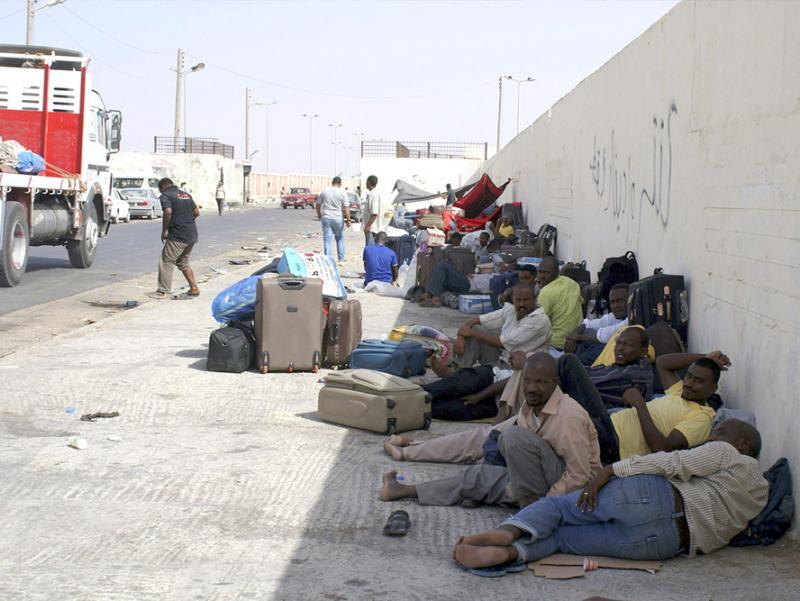Scepticism abounds over Egypt-Libya border wall
CAIRO - There is uncertainty in Egypt and Libya over whether a border wall under construction by the eastern Libya government will effectively curb infiltration by militants and the smuggling of arms.
“Such a wall cannot succeed in preventing either the infiltration of terrorists or the smuggling of arms between the two countries,” said Libyan activist Alia al-Ubaidi. “The two countries need to utilise modern border control technologies and stop depending on traditional measures.”
A Libyan contracting company was commissioned by the eastern Libyan government to build the wall along the border with Egypt, augmenting the Musaid border crossing.
One of the major border crossings with Egypt, Musaid is 150km east of the Libyan port city of Tobruk and 225km west of the Egyptian resort town of Marsa Matrouh. It is the Libyan side of the Salloum border crossing, which Cairo has reinforced significantly in recent years with additional troops and armoured vehicles.
Work started on the wall January 20, the security directorate of the Musaid border crossing said.
The wall is the latest bid by Libyan authorities to turn the border with Egypt into a source of security, instead of one for threats.
The Egyptian-Libyan border developed into a hotspot for smuggling when Libya descended into chaos after the 2011 uprising against Libyan leader Muammar Qaddafi.
Qaddafi’s arms stockpiles, which initially were taken by militias fighting his regime, ended up in the hands of militant groups active in Libya, including the Islamic State (ISIS), which also has a branch in Egypt’s Sinai.
Egyptian authorities say most of the arms used by ISIS against Egyptian forces in Sinai are from Libya. Cairo has also said that many militants have sneaked across the border from Libya to join the fight in Egypt. However, the border has lately become an increasing route for Islamists fleeing into Libya to escape from Egyptian security forces, security analysts said.
Miloud Jawad, a senior officer at the eastern Libya Interior Ministry, on January 21 told private Libyan TV Channel 2018 that the wall would help Libyan and Egyptian authorities control the border.
The barrier wall starts at the Musaid border crossing and is planned to be 1km long and 3 metres tall, a statement carried by the Musaid border crossing’s directorate on Facebook said.
Scepticism is high, however, over whether the wall can have a positive effect on security in Egypt and Libya.
“One of the reasons this is true is that the joint border between Egypt and Libya is more than 1,200km long,” said Samir Ghattas, a member of the Egyptian parliament and president of Egyptian think-tank Middle East Forum for Strategic Studies. “The border area is also far from easy to control.”
The Egypt-Libya border can be divided into the northern 265km stretch, which includes Salloum and Musaid and which is the most heavily defended, and a 785km stretch where rugged terrain forms a natural barrier.
Securing the border with Libya is a daunting mission for Egypt at the military and financial levels, especially with the lack of a fully functioning state in Libya.
Egyptian rapid reaction units are deployed in the Western Desert to foil attempts to smuggle arms or militants into Egypt. Egyptian fighter jets have destroyed hundreds of vehicles carrying arms and explosives as they tried to drive into Egyptian territory.
In July 2017, Egypt opened the Middle East’s largest military base near the border with Libya. In addition to a huge training ground and facilities for Egyptian, Arab and African militaries, the Mohamed Naguib Military Base is also designed to bring together enough Egyptian troops to allow rapid deployment near the border in the event of emergency.
At a briefing January 27 following talks with French President Emmanuel Macron in Cairo, Egyptian President Abdel Fattah al-Sisi said militants had arrived in Libya from every part of the world to harm neighbouring countries. “We are securing a border that stretches over 1,200km from a large number of terrorist elements that are assembled in Libya,” Sisi said.
Other neighbours of Libya have also sought to find ways to shield themselves from militants based in Libya. In August 2016, Algeria announced the construction of a 350km-long, 3-metre-tall wall along the border with Libya to better control the area.
Egyptian security and military called for Cairo to follow Algeria’s example and erect additional border walls and fences along the Egyptian-Libyan border. However, as with US President Donald Trump’s controversial border wall with Mexico, the question of financing remains and many Egyptians are calling for Libya to finance construction of a wall.
“This will, however, be far from easy,” said retired Egyptian Army General Talaat Musalam. “A border wall will be far from effective so long as there is no security control on both sides of the border.”
Ahmed Meghid is an Egyptian reporter based in Cairo.
This article was originally published in The Arab Weekly.







